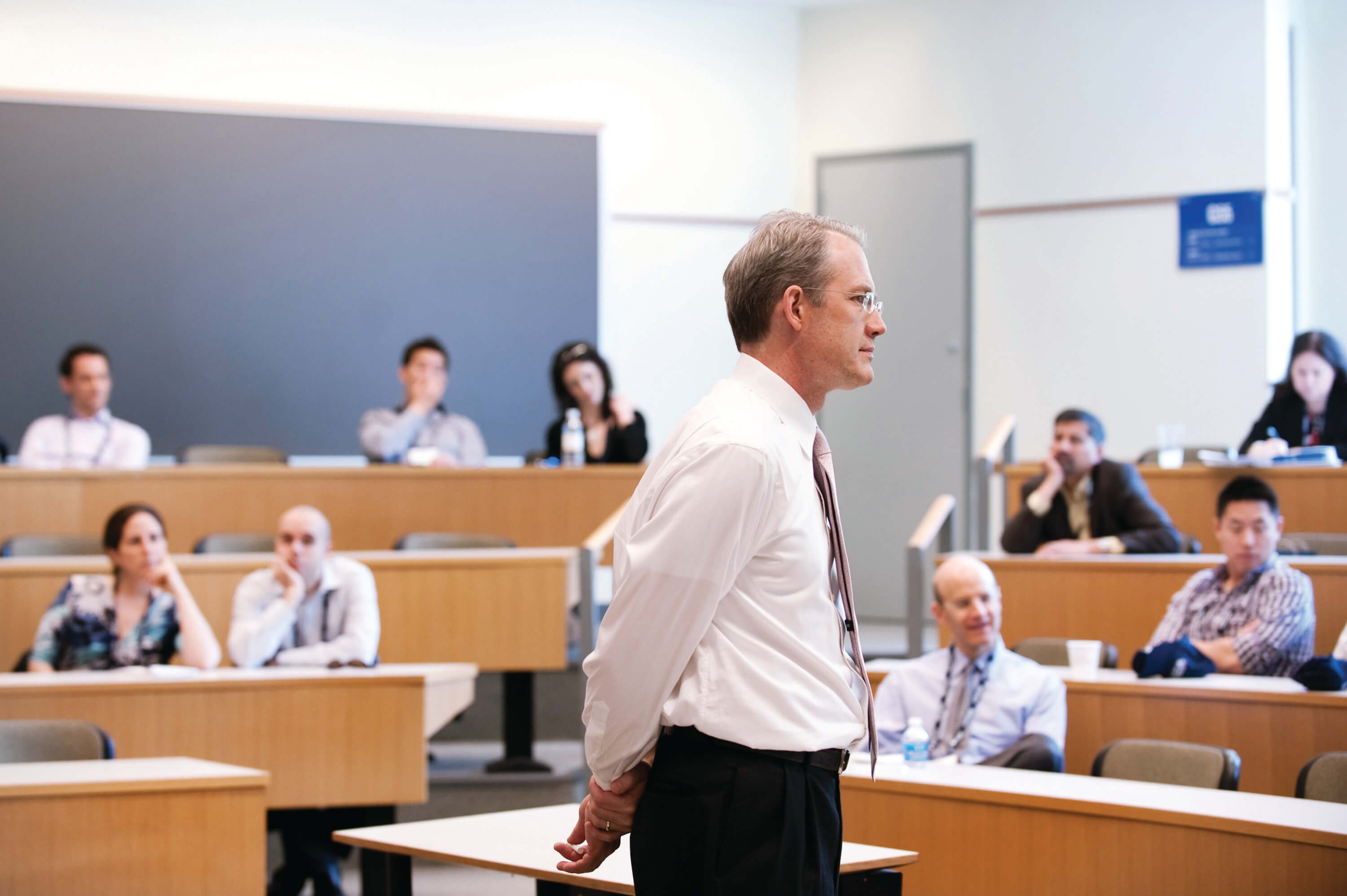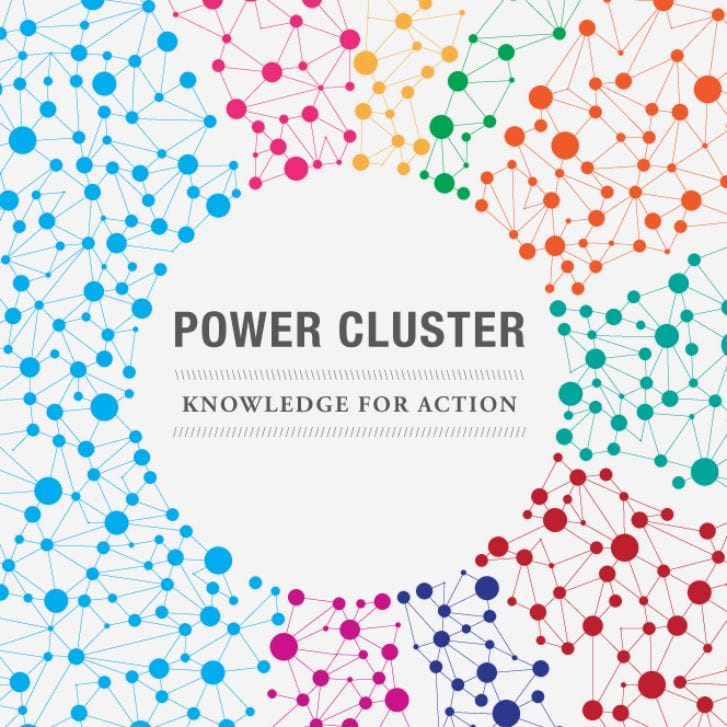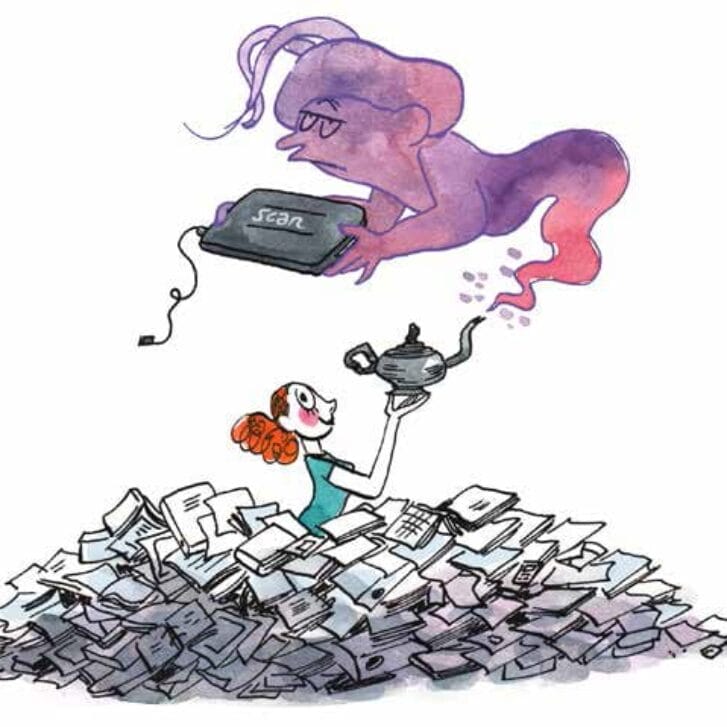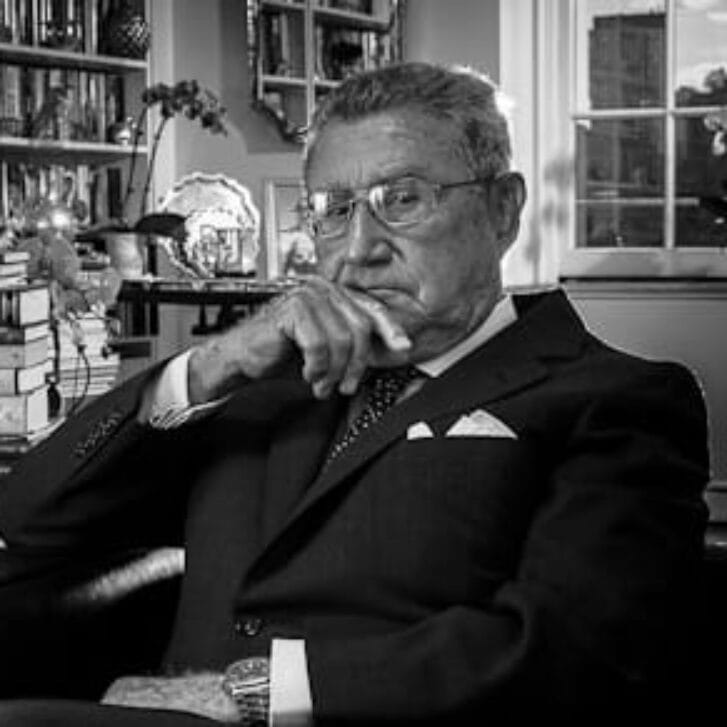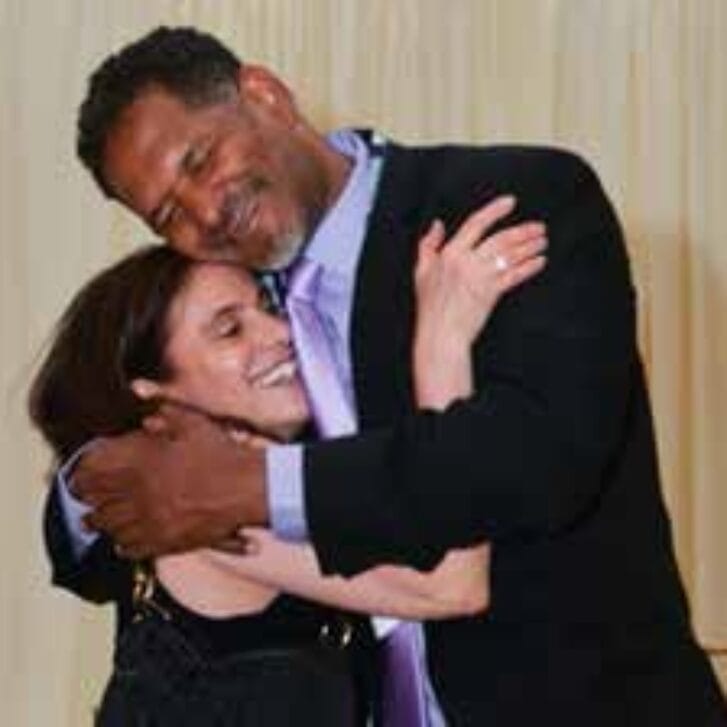Wharton alumni measure educational experiences against memories of their time on campus. The fascinating topics, dynamic instructors and engaged classmates made learning relevant and exciting. At MBA Reunion 2012, Karl Ulrich helped a lecture room full of alumni to create new memories. The topic: innovation tournaments, one which the CIBC Professor of Entrepreneurship and eCommerce and vice dean of innovation has mastered through research, teaching and practice.
Ulrich brought innovation tournaments, and the audience, to life.
“Right!” some alumni called out each time Ulrich made a point. They clapped. They nodded their heads. They placed fingers on pursed lips, squinted at the teacher and contemplated the depth of what he was suggesting—and how it impacted their businesses. Then, at perfectly timed jokes from Ulrich, attendees erupted into laughter. It was as much entertainment as it was inspiration, as much revelation as education.
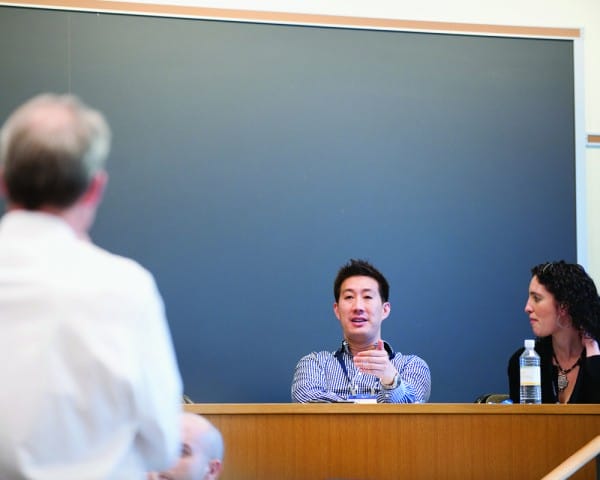 This year, Wharton put innovation practices to use, identifying the topics to be delivered at Reunion through an online tournament. It was a success. In the tournament, alumni suggested and voted for topics, and the resulting sessions resonated with alumni from all different industries and career stages.
This year, Wharton put innovation practices to use, identifying the topics to be delivered at Reunion through an online tournament. It was a success. In the tournament, alumni suggested and voted for topics, and the resulting sessions resonated with alumni from all different industries and career stages.
Ten of the top 15 topics from the tournament were used to shape the intimate Reunion Thought Team Workshops. Panels and faculty presentations planned in a more traditional manner focused on the other five topics. By using innovation practices, Reunion organizers were able to identify more good ideas than they would have uncovered otherwise.
But alumni’s opportunity to engage in Lifelong Learning does not begin and end with MBA Reunion. It is available every day for all Wharton alumni. The “Knowledge for Action” that Wharton delivers to all of its alumni has many facets that can help graduates continue to develop skills and insights so they can lead in an uncertain and complex global marketplace.
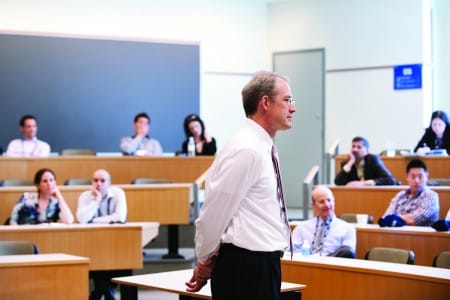
Professor Karl Ulrich listens to alumni participants in the Implementing Innovation Thought Team.
A concept Made Tangible
To help make this concept more tangible, let’s return to Ulrich’s aforementioned keynote address about innovation tournaments, the practice by which an organization makes a call for ideas and solutions to a given problem or question and next filters those submissions until the most promising few remain.
To illustrate a point, Ulrich mentioned the process by which Wharton came up with its new branding message. Alumnus Adam Stein, WG’06, submitted seven of the top 50 ideas in a crowdsourced tournament, including the one that eventually evolved into “Knowledge for Action.” Ulrich’s lesson: Tournament organizers should specifically solicit ideas from individuals known for being innovative.
Then came the questions. One alumnus, who introduced himself as someone involved in innovation, asked how best to design filters during a tournament.
Ulrich explained that filters should be designed to be generous at first, when uncertainties are high and costs are comparatively low, and more aggressive later, when the situation is reversed. This ensures that promising but underdeveloped ideas are not prematurely excluded but instead can be cultivated to become not only viable, but exceptional.
The professor showed a graphic of how innovation tournaments work at pharmaceutical companies: with 10,000 dots representing prospective drugs on the left of the filters, and one dot on the right.
What if you are an entrepreneur who says, “I am that dot,” an audience member asked, pointing at one of the 10,000 on the left. The answer: Believe you can become that dot left standing.
— READ THE SIDE STORY: LIFELONG LEARNING IN ITALY’S CAPITAL OF BUSINESS —
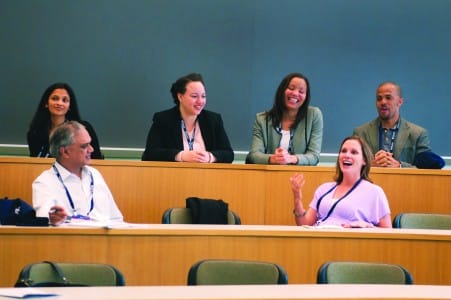
Learning From Others
During the Zen Capitalism Thought Team Workshop, Stewart Friedman, Practice Professor of Management and director of the Wharton Work/Life Integration Project, and more than 30 Wharton alumni discussed the search for a more integrated, sustainable life.
As part of the exercise, Friedman asked participants to assess how much attention they proportionally give to each sector—work, family, community and self—and how much they would like to give proportionally, as well as their level of satisfaction and performance in each domain. He encouraged alumni to follow up on this analysis at home, by speaking to the stakeholders in each sector about their performance.
“By inquiring of each of your critical stakeholders, you discover that what they actually expect of you is a little bit different—and often a little less—than what you thought they expected,” Friedman said.
He challenged participants to try an experiment: to make one small change that would have a positive, measurable impact on all domains, to pursue what Friedman calls a “four-way win.” Simple examples might be daily exercise, delegating responsibilities or holding a weekly family meeting. Such experiments help them learn how to create sustainable change because these initiatives are deliberately designed to make things better not just for themselves but also for their family, community and work.
Friedman has run this course, which he calls “Total Leadership,” for companies like Ford, Target and UnitedHealth Group, as well as for Wharton MBA, Executive MBA and Executive Education classes. In one study with 300 participants, he found that, as a result of this program, participants shifted some of their attention away from work and toward the three other sectors, yet the counterintuitive outcome was that their performance and satisfaction improved in all four domains, including work.
Friedman told Wharton Magazine that most attendees were interested in “ideas for action” and came prepared for the session. After all, people self-selected into this particular Lifelong Learning seminar. The Thought Team was by no means homogeneous.
“The variety of ages and life stages made for a real interesting mix,” he said.
This diverse group enabled Friedman to run a peer-to-peer coaching exchange during the workshop, during which the participants broke into groups of three.
“I think it was instructive to hear other people speak about their aspirations,” Friedman said. “When you get a varied group like that to explore something that they all have an interest in … [that] taps into fundamental aspects of who they are, it usually is pretty exciting.”
Indeed, it was so exciting that the first day’s Thought Team Workshop created a buzz that led to higher turnout on day two. After the event, Alumnus Eric Bohren, WG ’97, G’97, wrote to thank Friedman: “For 15-year Wharton Reunion folks, many of us with young families and searching for more fulfillment as we hit midcareer, this session could not have been [at] a better time,” Bohren said, adding that he had posted about the session on the WG ’97 Facebook page and encouraged classmates to attend on the second day.
“It is a really good fit with my own therapy/consulting work with patients and businesses around managing stress in our lives,” Patrick Meade, WG’97, Ph.D., said in an email to Friedman, “and also offers a great way of framing the discussion about how focusing on improving things for oneself can create improvements across multiple domains.”
— READ THE SIDE STORY: KNOWLEDGE FOR LIFE: THERE ARE APPS FOR THAT —
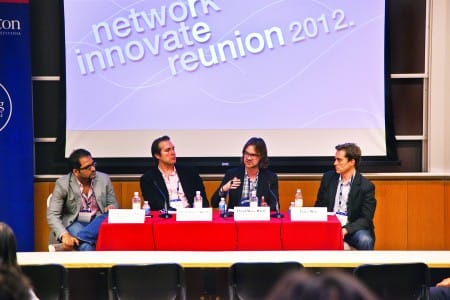
The entrepreneurship panel featured OfficeDrop’s Prasad Thammineni, Healy Jones and David Mars (all WG’07) and Professor Tyler Wry as moderator.
An Approach for All
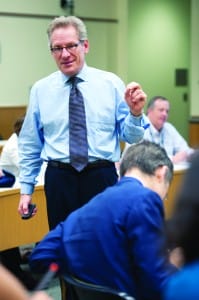
Professor Stewart Friedman talks Zen Capitalism. Friedman also serves as the executive director for the emergent coaching network called the Wharton Alumni Peer-to-Peer Exchange (P2PX), a major component of Wharton Lifelong Learning.
The lectures and panel presentations at Reunion provided content that was just as stimulating as the Thought Teams but on topics of broader interest and in larger venues. The entrepreneurship panel featured three alumni involved in OfficeDrop, a document-management service that helps small businesses manage their files using cloud storage. CEO Prasad Thammineni, WG’07; Healy Jones, WG’07, vice president of marketing; and David Mars, WG’07, their major early investor and board of directors member, shared lessons learned about launching a startup during an economic downturn. Thammineni got the idea for the company while at Wharton and launched its initial phase in the year following graduation.
To combat a poor economic climate, the trio touted the importance of adaptability and innovation. Just last year, they pushed 20 customer-driven updates to their product.
“What you start with is not what you end up with,” said Thammineni. “You are trying to build an idea that customers want, but you have to be ready to change that idea based on your customers.”
Mars advised future entrepreneurs to keep in mind that “raising money takes longer than you ever anticipated and goes more quickly than you ever anticipated.”
The presentation also ranged from OfficeDrop’s distribution strategy to how a company can know it has a good product, to new Internet strategies like minimum viable product and pivoting. And it was a conversation. The Q&A began soon into the session, Jones recalled, something that surprised and impressed him.
The audience consisted of self-professed corporate employees looking for guidance on how to break free with their own startups and active entrepreneurs.
“I think it was really neat that entrepreneurs were in the class and using it as a way to bounce strategies here off of each other,” Jones said.
It shows the strong desire of the Wharton community to get together and learn from each other. What was “phenomenal” in particular about his Lifelong Learning session, according to Jones, was that Assistant Professor of Entrepreneurship Tyler Wry moderated it. Professors know how to manage such interactive discussions and have deep insight into the given topics.
At Reunion, alumni also had an opportunity to explore topics they didn’t pursue while enrolled on campus, either because they were interested in other topics or the content was not part of the curriculum at the time, especially those focused on cultivating relationships. During the real estate session taught by Asuka Nakahara, associate director of the Zell-Lurie Real Estate Center, many alumni revealed that during their time at Wharton they had not taken any courses that centered on the topic of real estate investment. Yet they packed a lecture room in Huntsman Hall to learn about it five, 10, 25 years beyond graduation. Some alumni noted that topics like social media and Zen Capitalism weren’t even on the radar when they were enrolled.
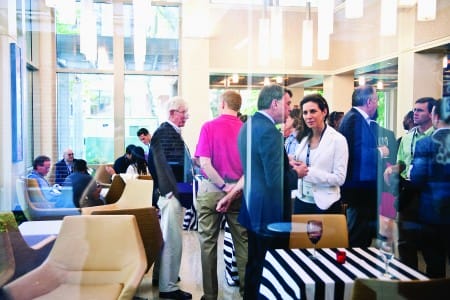
And Wharton professors also shared with alumni their insights into current-day headlines and global trends. Jeremy Siegel’s keynote address, which packed the Harold L. Zellerbach Theatre in the Annenberg Center on the Saturday morning of Reunion, was as newsy as it can get. The Russell E. Palmer Professor of Finance shared his optimistic view on the past, present and future of the stock market. On the fiscal situation in the United States, brought on in part by growing entitlement costs, Siegel was hopeful too. If emerging markets grow at the projected rate of 5 percent—driven by the rise of these markets’ middle classes—it would create the value to allow Americans to live long, happy retirements if they index retirement to increasing life expectancies. Better yet, if emerging markets grow at India’s and China’s pace, then Americans would be able to continue to retire earlier as they live longer.
“I found that very encouraging,” said John “Jack” Smith, W’51, WG’52. Smith related the “bright sides” of Siegel’s lecture to the attendees of the luncheon for the 45th and 50th Reunion classes and the Wharton Graduate Emeritus Society, for which Smith is chairman of the steering committee.
Lifelong Learning is based on this premise: that Wharton alumni prize their continued interaction with their faculty and with each other.
Alumni want to experience the same rush of inspiration that they got as full-time students on campus. They want to be stimulated by new information and their peers, relationships and knowledge that they can carry back to their jobs and to their lives.
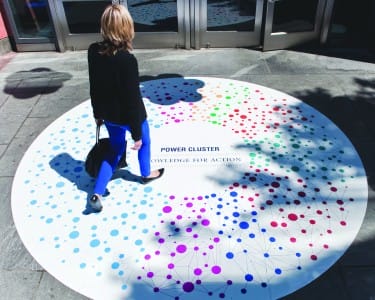 During his Reunion session, “Customer Centricity Essentials,” Peter Fader, the Frances and Pei-Yuan Chia Professor and co-director of the Wharton Customer Analytics Initiative, conjured the kind of dynamic dialogue that illustrated how alumni are “students,” as well as his and each other’s peers. He so galvanized his audience that Fader mentioned that he teaches a whole MBA course on the topic if the alumni want to “come on back” for more.
During his Reunion session, “Customer Centricity Essentials,” Peter Fader, the Frances and Pei-Yuan Chia Professor and co-director of the Wharton Customer Analytics Initiative, conjured the kind of dynamic dialogue that illustrated how alumni are “students,” as well as his and each other’s peers. He so galvanized his audience that Fader mentioned that he teaches a whole MBA course on the topic if the alumni want to “come on back” for more.
The lecture room erupted in laughter. Who wouldn’t want to return to the School?
Lifelong Learning and other components of Wharton’s Knowledge for Action ensure that alumni enjoy the benefit of remaining Wharton students and learning with their peers, propelling their continued success and well-being for life.
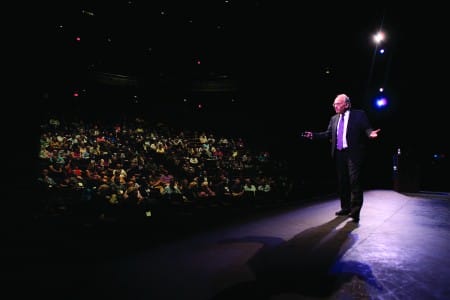
Professor Jeremy Siegel comments on the past, present and future of the stock market during his keynote presentation at Reunion.
Editor’s note: Read the two side stories to our summer cover story about Lifelong Learning and MBA Reunion 2012: “Lifelong Learning in Italy’s Capital of Business” and “Knowledge for Action: There Are Apps for That.”




















